In this last in a series of three interviews, Joe Strike talks with historian and filmmaker John Canemaker about his family and his latest film, the confessional The Moon and the Son.
Read Part 1 and Part 2 of Joe Strikes interview with John Canemaker in which he talks about his early career, teaching at NYU and his influences.

The Moon and the Son is John Canemakers latest short film. © John Canemaker.
The Moon and the Son
John Canemaker: After The Wizards Son I went on to do films that were more free form, the kind I like to do. Now, after The Moon and the Son Im getting the bug to do another film on a serious subject. It might be something adult that would again be freeform in its graphics and visuals, but with a strong narrative. I like variety. The Moon and the Son is also eclectic in terms of design and style. Its built around remembered or reconstructed conversations that were then performed by actors.
Joe Strike: Eli Wallach and John Tuturro are the father and son. Did you direct them, or just let them rip?
JC: No, it was definitely scripted. The dialog is based on actual conversation I had tape recorded with my father, plus actual transcripts from his trial [John F. Cannizzaro Sr. spent five years in prison for setting fire to his failing business] and remembered conversations.
JS: Elis performance sounded a little on the caricatured end of the scale was that on purpose?
JC: No, Ill tell you the truth. My father spoke broken English thats just how he sounded. I told Eli the voice had to be done with an Italian accent and when he first did it the microphone was blocking my view of him. I read with him on that, and I started to tear up because it sounded just like my father exactly like him.
I began working on this film some years ago, thinking about how to do it. In 1999I got a grant from the Rockefeller Foundation to go to Bellagio, Italy, which is on Lake Como for a month to develop this film.
JS: This wasnt the area of Italy where your father came from?
JC: No, it wasnt which was ironic, but there I was in Italy, there was a certain puissant feeling about it. They picked us up in Milan, then we drove to this villa everything was given to us.
JS: Nice work if you can get it.
JC: It was great. I stayed at the Rockefeller villa with poets and musicians and other artists we were each given a separate studio. They would feed you and you got all your meals. We all looked at each others work and commented on it. I had this wonderful stone studio with nothing in it but a computer and drawing tables. It was a tiny thing but I could look out on Lake Como every day.
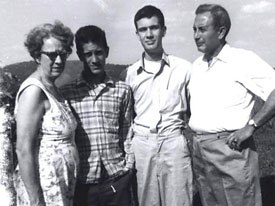
The Cannizzaro family, circa 1960. Canemaker stands second from the right. All photos courtesy of John Canemaker.
JS: When you went to Italy you had this idea in mind, I want to do this film about my dad and myself, but you didnt have a visual or a story thread yet?
JC: No, nothing. In fact, I went over there and I thought to myself, Now youve really gotten yourself into something. You got here saying you were going to do a story. You have no story but the creative process is such that you make one drawing and it leads to another. You take a piece of research and it sort of inspires something else. And the thing just came out. Again, that may be part of my overall philosophy of things will work out, but you have to work at it and have the research and material to go with. I have the trial transcripts, my fathers interview, I had photographs that inspired me, drawings, sketches that I had already done.
I started to work on the film for real there, pinning up new sketches in my studio and watching it come together. By the time the month was up, I had a script and a storyboard pretty much worked out. I Fedexed it back to the States, made copies of it, then came back home and worked on it a bit more.
In the meantime I lost a year working on animation per se. I was writing and coming up with more books, but I lost a year because I became the chair of NYUs undergraduate film and TV department for the school year beginning in the fall of 2001 the 9/11 year. It was an extremely stressful and involving time.
After that I made up for lost time. I had the layouts, I did all the animation myself. It was the summer about a year or so ago in which my students helped, pitched in and helped color it. Bit by bit I did things, I contacted Eli and got that recording done, got the exposure sheets worked out. I was the original voice for the son, but I never liked my voice [laughs], so I fired myself and decided to get an actor.
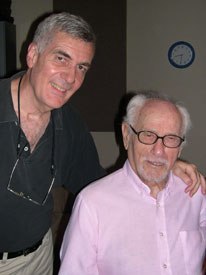
Canemaker teared up when he first heard Eli Wallach (right) voicing the part of his father for The Moon and the Son.
JS: That was probably a good idea, especially since youre playing off Eli Wallach.
JC: John Tuturro liked the piece very much and Eli was great; he called up John and said [imitating], I want you to be my son.
JS: Do you think animation might have been a way of creating your own world as opposed to your fathers world that you felt trapped in?
JC:
I guess so. I left home pretty early, at 18. In total we didnt spend that much time together because he was in jail for five years, and when I was very young he was away in the war. There was really that much time but what there was was not cherce, as Spencer Tracy said to Kate Hepburn.
JS: What age were you when he was in jail? Im trying to get an idea of when his influence was missing from your life.
JC: Something like from when I was 10 through 15; it was a crucial time, either during my pre-teen or teen years.
JS: I would assume you had mixed feelings about him not being there.
JC: A lot of mixed feelings. I felt okay about him being away. I tried sometimes to convince my mother to leave him but she wouldnt.
My father was disappointed in me, I think in many ways. A lot of it was his frustration with his own situation and how things werent going his way. I was the thing that he was trying to change. Even years later when I was living in New York, he kept asking, When are you coming home? Ill give you $25,000 if you start a restaurant with me up in New Haven, that sort of thing.
JS: But he built you that animation stand.
JC: He did, but that was only one thing. Also, my parents both drove me to New York, literally in the car, and trusted me enough to let me go out on my own. There really was no choice; if I had stayed in Elmira God knows what Id be doing.
JS: I suspect even if they hadnt let you, you wouldve gone anyway.
JC:
I guess so.

Canemaker had mixed feelings about his father's five years in prison. In this scene from The Moon and the Son, a jailbird confronts a jailbird, Canemakers father.
JS: Theres this conundrum of getting this help from him, but not really feeling the support of letting you go your own way.
JC: He was very surly and difficult. I know now of the financial concerns he had, the things that drove him to try and cut corners and got him into trouble. He had a fiery temper and a quick, back-of-the-hand way of taking care of things like that. Even in old age, if he would get on the wrong subject, his face would contort and he would get angry about it. I would say, Stop thinking about it Dad and it wont affect you, but he would go, Oh, that sonuvabitch
JS: Sometimes its hard to get rid of those thoughts it runs through your head like a tune you cant get rid of. The film was an attempt to come to terms with your father and his influence on you, your unresolved feelings about him. Did it work? Do you feel like you put it to bed at this point?
JC: In a way.
JS: But not in other ways?
JC:
I dont think it can ever be resolved. It remains what it was. I just gave my side of it. It has been a cathartic experience for me and certainly for my brother. He came down with his wife for the premiere at the Museum of Modern Art the beginning of this year.
JS: Was it cathartic for him for the same reasons as you?
JC: Yes. Tony didnt leave; I did, when I was 18. He lived there for over 30 years not in the same house as our parents. He got married and moved out, but the problems were still there.
JS: He was still in their orbit.
JC: There was a lot of hostility and angry feelings and stuff going on. For many years we were ashamed of the trial and being known as a family with someone who went to jail. Occasionally there would be a mention of that time in the local papers: Twenty-five years ago this happened Now, its all sort of out there and he feels very relieved about it.
JS: It loses its power when its not a secret. Was this part of the reason you changed your name?
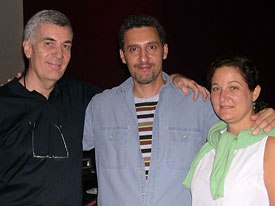
Canemaker fired himself as the voice of his character in The Moon and the Son and hired John Turturro (center) instead. Here they appear with producer Peggy Stern.
JC: I never changed it legally. It still says Cannizzaro on all my legal records. When I came to New York I wanted to be an actor. I was trying out for shows and I finally got one in fact I got three off-Broadway shows in 1964, one after the other. An actor who had changed his name said, Oh, your name is too ethnic this was before the days of DeNiro and that sort of thing. I said, What am I going to change it to? He asked me Well, what does it mean? I said, Hmm, it probably means the maker of canes or something like that.
JS: Off the top of your head.
JC: Yes, he was sort of advising me about this. I wrote it down and signed the contract John Canemaker. It stayed with me and now its on all these books. I dont think I can change it back now its too long to hyphenate. I do have it that way at the beginning of The Moon and the Son but at the end its still directed by John Canemaker.
The film has just been accepted by the Annecy festival for competition in June. We want to show it in a number of festivals this year to sort of build up its momentum. HBO was one of the backers, and they plan to run it on Cinemax in 2006.
JS: One of the things that came to mind when I watched the film was Art Spiegelmans Maus[his graphic novel recounting his fathers experiences in the Nazi death camps and how it affected their relationship]; was there any kind of idea, did you read that and say Oh gee, this is
JC: No, but I know it, and of course Ive read it in the past and I admire it very much. It mightve been there in the back of my mind but it was not conscious.
The film has whetted my appetite for wanting to do future films that have a strong narrative to them. Id like to try have people weep at the end of a film that Ive made, and have them laugh when I want them to laugh. Its a very powerful incentive to try to do more films with a strong narrative base.

Bottoms Dream inadvertently led Canemaker to Yoko Ono and the chance to animate John Lennons Sketchbook. © John Canemaker. All rights reserved.
The Interpreter
JS: Youve animated John Lennons sketches and Keith Harings paintings. Youre someone with a very distinct vision, but youre also an eclectic artist; I would think that lends itself to translating these peoples styles into frame-by-frame animation. Is that hard or does it put you on guard, Ive got to be respectful of the source?
JC:
Absolutely. I find that difficult and thats why Im not a studio person, because I can never really adequately conform my style to the required style. I cant really keep things on model and all of that.
JS: How did you come to do the John Lennon film?
JC: In a way it began with a man named Charles Samu, who unfortunately is dead now. He distributed Bottoms Dream for a while; in the early days of HBO he was in charge of interstitials. Hes the reason I went to Hiroshima in 1985 for the 40th anniversary of the dropping of the bomb. He was on a committee that pushed for me to go.
This is a very weird story. The limousine that picked me up at the airport had a driver and an interpreter. My interpreter turned around and said, Hello, my name is Yoko. I was so jet lagged I said something like Oh, Yoko. I have a neighbor in New York named Yoko. She asked the famous Yoko Ono? Yeah, yeh. Do you know her? No, but I see her in the neighborhood all the time. We used to see her and John, and I respect her privacy.
The festival happened and I came back to New York. That year I got a Christmas card from Yoko Ono: Thank you for respecting Seans and my privacy. I wrote her a note back saying, This is really interesting Ive always wanted to animate Johns stuff. The next thing I got a phone call to come over to 72nd Street to meet Yoko. We eventually made John Lennons Sketchbook, which was a little 4 minute film using Johns drawings.
JS: Did the interpreter get in touch with the famous Yoko?
JC: She did she wrote a letter to her. Isnt that weird?

Mafia guys make an appearance in The Moon and the Son.
JC: I just think time is so precious. Generally, I like to do what I do rather than other peoples stuff. Even though I dont have someone looking over my shoulder when I take on sponsored jobs, I still try to preserve the integrity of the original work as much as possible.
JS: It sounds like those really arent as much fun as the ones where you can express yourself fully.
JC: Although some of the sponsored things are as interesting as my independent films. I loved doing the things on child abuse and the cancer films because of the creative challenge of using my artwork to express those ideas.
JS: And again youre using the stuff as inspiration for your own work, not as a straightjacket.
JC: Yeah, someone whos a stylist like me comes in, and they have their own way of drawing and expressing themselves.
JS: Do you say, Im sorry this isnt for me, or do you take it on?
JC: Sometimes I do. Theres a funny story. I wont mention the animator, but a guy whos done very cartoony stuff got a call for a job once. He said, Yeah sure, whats the subject matter? The person on the phone said dyslexia, and he said, Oh no, you want John Canemaker.
JS: I wonder if he considered your style dyslexic.
JC: [Laughs] I think its because I take on these subjects
JS: The medical/diagnostic things.
JC: Ive done public service announcements for GMHC, working on AIDS, I did the whole Creative Spirit stuff, which was just about the imagination. All of these weird things that have to be manifest.
JS: You said you wanted to do more narrative pieces with emotional impact
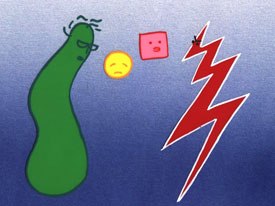
The family as an abstraction in The Moon and the Son.
JC: Maybe film a short story or something.
JS: Ever want to participate in something bigger, more mainstream, professional, maybe an animated feature?
JC: I never have, and I always think that animation perhaps works best in the short form, an essentially concentrated thing. I know that Walt Disney pioneered the longer form, but he did it by emulating live action for the most part. Whenever anything irrational happens in Disney features its because of a rational reason Dumbo sees pink elephants on parade because he gets drunk. The Fleischer world is a wild world, but no, Im not interested. Doing a 30-minute film by myself is as exhausting as I want to get.
JS: Also, youve got a lot of other irons in the fire. What do you think about 3D/CGI?
JC: I think its great. I think the computer is a wonderful tool. Its already had a huge impact and I think the future of animation is going to be profoundly affected. I just saw something recently a sentient form of computer animation.
JS: What does that mean?
JC: It has a brain and can make decisions about where its going to move and what its going to do. I shouldnt talk about it too much because Ive just proposed a piece this morning to the New York Times about it. Were going to see a lot more interactivity in the future. Look where we were in 1905 imagine where were going to be in 100 years. I think its really going to be an incredible thing, and its starting now.
I think animation is still a largely unexplored art form. I think theres so much that can be done with animation as memoir, as a diary, to express very intimate feelings, to make the feelings absolutely concrete in a way that live action cant do. I just think perhaps in a small way Im exploring those avenues, those paths that havent been often trod. Im not interested in stuff that doesnt affect me personally. Life is too short. I want to express myself. Its a very selfish thing. Let other people do their own stuff in their studios. I admire it, and I write about it and I celebrate it, but I dont want to do it. [Laughs]
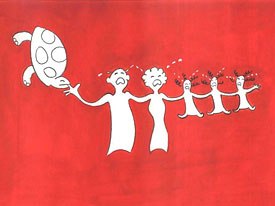
The Moon and the Son was developed by Canemaker during a month stay on Lake Como courtesy of a grant from the Rockefeller Foundation.
JS: Youre very lucky because a lot of people dont have that choice; Ive got to take this job, I gotta pay the rent.
JC: I like my independence, and I like doing a whole bunch of things, maybe because Im a Gemini. I like the eclectic quality of my life and my career. I dont get bored because I do the writing, that leads me to a film, the teaching is always there to keep me stimulated with young people challenging me.
I think I learn something else with every film. I believe Im learning, I believe in education. My whole life was changed by education, by going to college, and making that move to find out more about myself. I try to impart that to my students that this is a great time for them and they should dive in and enjoy the smorgasbord that we offer them at NYU, try everything.
JS: Do you think some people have an innate appetite to learn, regardless of their background?
JC: I guess Im a survivor and my father was a survivor. It was one of the things I admired about him and I think I inherited. I think Ive accomplished something with my life, which I never thought I would when I was 18 and coming to New York alone with no money. Its just kind of unbelievable.
JS: There was a line of dialog in The Moon and the Son I had to write down: Animation was a world I could completely control instead of being controlled by you. Is that something you truly feel, or was that just for the dramatic flow of the film?
JC: Yeah, animation is something I can control; its like gardening, in a way. It has an instant gratification about it. Youre controlling a world, and youre reordering it, youre arranging it to your liking.
JS: The animation process doesnt sound quite like instant gratification.
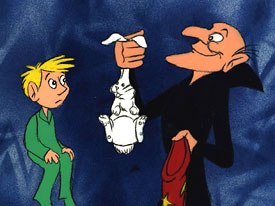
If the wizards son (left) was all grown up, hed be like Canemaker: a one-man band and very happy doing which is what he wanted to do. The Wizards Son © John Canemaker. All rights reserved.
JC: No, but I like to draw, so its gratifying to me to be able to flip the pages and with that persistence of vision, you can see it come alive. Now with computers and scanning you can see it onscreen immediately as well. It isnt a completed thing, but its a feeling, a sensation, so there is an element of that satisfaction.
Its interesting, I dont really draw for just the sheer pleasure of it, I draw for a purpose, I draw when I need to.
JS: You dont draw just to get loose.
JC: No, if I need to research something then I start to draw and I get very serious about it. But its kind of an effort in a way to paint, because I do that just for myself.
JS: So when it comes time to do it self-indulgently, for your own pleasure, it doesnt come that easy.
JC: No, I need a purpose. I need to have a project, something that catches my eye and I want to paint it and that leads me to a film; that needs to be researched. I need motivation.
JS: Sounds like a real work ethic.
JC: Yeah, thats right. Im a workaholic, and I dont mind hard work. Im very much in my realm working on several things at once. Time goes by; Im getting old.
JS: Heres my last question
JC: Uh-oh.
JS: What do you think the wizards son is doing now that hes grown up? Or is he one of those cartoon characters who never changes?
JC: Hes a one-man band. Hes a conductor and hes very happy doing, making music, which is what he wanted to do. I guess you could say the same for me.
JS: Thats what I was wondering.
JC: Im very happy with all the things Im doing and really consider it miraculous, and although Im not a religious person I think theres an interesting arc to my life.
JS: Do you see it going new places or do you think youve got that groove?
JC: I think Im doing what I should do, and Id like to continue doing more of it more painting, Id like to make another film I dont know what it is at this point. Im open to writing more books and articles and teaching and just continuing to continue.
Joe Strike is a NYC-based writer/producer with a background in TV promotion and a lifelong interest in animation. He is writing a childrens novel.







